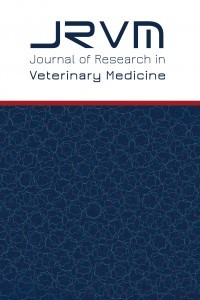A Phylogenetic and Genotyping Study of Bovine Herpesvirus Type 4 (BHV-4) in Turkey
Reproductive Infection, Bovine herpesvirus Type 4 (BHV-4), Repeat-breeder, Infertility, Genotyping Turkey,
___
- 1) Chastant-Maillard S. Impact of bovine herpesvirus 4 (BoHV-4) on reproduction. Transbound Emerg Dis. 2015;62(3):245–251. doi:10.1111/tbed.12155
- 2) Bartha A, Juhasz M, Liebermann H. Isolation of a bovine herpesvirus from calves with respiratory disease and keratoconjunctivitis. A preliminary report. Acta Vet Acad Sci Hung. 1966;16(3):357–358.
- 3) Davison AJ. Herpesvirus systematics. Vet Microbiol. 2010;143(1):52–69. doi:10.1016/j.vetmic.2010.02.014
- 4) Bellino C, Iussich S, Biasato I, et al. Potential pathogenetic role of bovine herpesvirus 4 in two dairy cows with dermatitis-pyrexia-hemorrhagic syndrome. J Clin Microbiol. 2015;53(8):2763–7. doi:10.1128/JCM.00717-15
- 5) Egyed L. Bovine herpesvirus type 4: a special herpesvirus (review article). Acta Vet Hung. 2000;48(4):501–13. doi:10.1556/004.48.2000.4.13
- 6) Verna AE, Manrique JM, Perez SE, et al. Genomic analysis of bovine herpesvirus type 4 (BoHV-4) from Argentina: high genetic variability and novel phylogenetic groups. Vet Microbiol. 2012;160(1–2):1–8. doi:10.1016/j.vetmic.2012.04.039
- 7) Gagnon CA, Traesel CK, Music N, et al. Whole genome sequencing of a canadian bovine gammaherpesvirus 4 strain and the possible link between the viral infection and respiratory and reproductive clinical manifestations in dairy cattle. Front Vet Sci. 2017;4:92. doi:10.3389/fvets.2017.00092
- 8) Zimmermann W, Broll H, Ehlers B, et al. Genome sequence of bovine herpesvirus 4, a bovine rhadinovirus, and identification of an origin of DNA replication. J Virol. 2001;75(3):1186–94. doi:10.1128/JVI.75.3.1186-1194.2001
- 9) Rasheed MA, Ansari AR, Ihsan A, et al. Prediction of conserved sites and domains in glycoproteins B, C and D of herpes viruses. Microb Pathog. 2018;116:91-99.
- 10) Morán P, Pérez S, Odeón A, et al. Comparative analysis of replicative properties of phylogenetically divergent, Argentinean BoHV-4 strains in cell lines from different origins. Comp Immunol Microbiol Infect Dis. 2019;63:97-103. doi:10.1016/j.cimid.2019.01.014
- 11) Bilge-Dagalp S, Demir AB, Gungor E, et al. The seroprevalence of Bovine Herpes Virus Type 4 (BHV-4) infection in dairy herds in Turkey and possible interaction with reproductive disorders. Rev Med Vet (Toulouse). 2007;158(4):201.
- 12) Bilge-Dagalp S, Gungor E, Demir AB, et al. The investigation of the presence of bovine herpesvirus type 4 (BoHV-4) in cows with metritis in a dairy herd. Ankara Univ Vet Fak Derg. 2010;57(2):87-91.
- 13) Gür, S. Prevalence of bovine viral diarrhoea, bovine herpesvirus type 1 and 4 infections in repeat breeding cows in Western Turkey. Braz J Vet Res Anim Sci. 2011;48(3):228-233.
- 14) Aslan ME, Azkur AK, Gazyagci S. Epidemiology and genetic characterization of BVDV, BHV-1, BHV-4, BHV-5 and Brucella spp. infections in cattle in Turkey. J Vet Med Sci. 2015;14-0657.
- 15) Kale M, Ata A, Kocamüftüoglu M, et al. Bovine herpesvirus type 4 (BHV-4) infection in relation to fertility in repeat breeder dairy cows. Acta Vet (Beograd). 2011;61(1):13-19.
- 16) Yavru S, Avci O, Kale M, et al. Serologic and virologic investigation of BHV-1, BVDV and BHV-4 in cattle with metritis. Anim Vet Sci. 2014;2(5):142-145.
- 17) Yildirim Y, Yilmaz V, Kalaycioglu AT, et al. An investigation of a possible involvement of BVDV, BHV-1 and BHV-4 infections in abortion of dairy cattle in Kars district of Turkey. Kafkas Univ Vet Fak Derg. 2011;17:879-883.
- 18) Chomczynski P, Sacchi N. The single-step method of RNA isolation by acid guanidinium thiocyanate–phenol–chloroform extraction: twenty-something years on. Nat Protoc. 2006;1(2):581.
- 19) Wellenberg GJ, Verstraten ERAM, Belak S, et al. Detection of bovine herpesvirus 4 glycoprotein B and thymidine kinase DNA by PCR assays in bovine milk. J Virol Meth. 2001;97(1-2):101-112.
- 20) Kumar S, Stecher G, Li M, et al. MEGA X: molecular evolutionary genetics analysis across computing platforms. Mol Bio Evol. 2018;35(6):1547-1549.
- 21) Martin DP, Murrell B, Golden M, et al. RDP4: Detection and analysis of recombination patterns in virus genomes. Virus Evol. 2015;1(1).
- 22) Areda D, Chigerwe M, Crossley B. Bovine herpes virus type-4 infection among postpartum dairy cows in California: risk factors and phylogenetic analysis. Epidemiol Infect. 2018;146(7):904-912.
- Başlangıç: 1981
- Yayıncı: Bursa Uludağ Üniversitesi
Nosema ceranae ile doğal enfekte balarısı kolonilerinde NOSEBA®’nın etkinliğinin araştırılması
Mehmet ÖZÜİÇLİ, Levent AYDIN, A. Onur GİRİŞGİN, Betül SAYGIN, Nurgül ÇİMENLİKAYA, Yiğit ALTAV, Suna Aslı ZENGİN
G. Ülke ÇALIŞKAN, Deniz SEYREK-İNTAŞ, Nureddin ÇELİMLİ
Berfin KADİROĞLU, Gizem ALPAY, Kadir YEŞİLBAĞ
Ozan GÜNDEMİR, Gülsün PAZVANT, Nazan GEZER İNCE
Goksen CECEN AYALP, İsmail ALTUĞ ŞEN, Nihal Yaşar GÜL SATAR, Sibel TOKOĞLU SERT
Nilay SEYİDOĞLU, Deniz BELENLİ, Oguz MERHAN, Kadir BOZUKLUHAN
